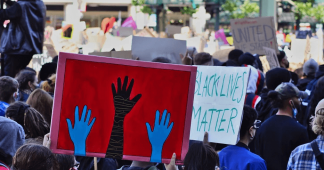By James MacDonald
The annual editions of The Best American Short Stories (BASS) series can be counted on for two things: First, each year’s installment includes a few stories that more than just engage one on a first reading, reward a second reading with the vitality of their prose or, better yet, with newly found outcroppings of their ideas.
Second, BASS maps for the reader the state of mind of a certain social layer. The volume’s hand-picked stories take up themes and strike poses that correspond to the tastes and preoccupations of the educated American upper middle class, tastes and preoccupations that also find expression, for example, in the pages of the New York Times and in university course catalogues. (It is worth noting that at least 11 of the 20 writers featured in BASS 2020 make their living in universities or writing programs.) There is nothing shocking or Machiavellian here. The series tends to reflect the outlook of the layer that produces, sustains and consumes it.
The stories in BASS 2020 were selected by novelist [Elizabeth] Curtis Sittenfeld (born 1975), a supporter of Hillary Clinton whose most recent work is Rodham (2020), an alternate history political novel about a Hillary who does not marry Bill Clinton and becomes America’s first female president.
In a review, Slate suggested, unpromisingly, that Rodham “has a strong whiff of longing about it, a resemblance to the category of fan fiction known as RPF, or real-person fiction, in which fans write fictional stories about actual celebrities.”
Given this inauspicious piece of literary history and the fact that BASS 2020 features stories written for the most part in 2017 and 2018, it is not surprising to find that an editor with Sittenfeld’s orientation chose for the anthology a number of #MeToo-themed pieces and one story that expresses disbelief at the outcome of the 2016 presidential election.
Some other themes explored, or at times simply presented, in BASS 2020 include adolescent sexual desire, adolescent bullying, adolescent identity, artificial intelligence, childhood friendship, adult loneliness and aging.
On display in many of these stories is an unexamined self-absorption, often self-pity, on the part of the central characters that the authors seem to mistake for emotional and psychological depth. In particular, pieces like Selena Anderson’s “Godmother Tea,” Meng Jin’s “In the Event” and Elizabeth McCracken’s “It’s Not You” presume that wallowing is not only a real human activity but an interesting one.
Notably absent from BASS 2020, perhaps with rare exceptions, is any serious examination of wealth inequality, class struggle, nationalism, militarism, war, dislocation, authoritarianism or unemployment, though these matters urgently demand careful thought and artistic representation in contemporary America. For the most part, the writers featured in the anthology are preoccupied with the feelings of largely passive characters.
It must be acknowledged that a short story is not a novel. With its restricted scale, the short story’s medium is the single consciousness, not cross sections of society. Its vision is that of the snapshot, not the feature film, and one does a disservice to the genre by asking it to plumb the social strata or depict the unfolding of a historical period in the ways a novel can. But a well-composed snapshot can capture its time, and a well-conceived short story can depict historical forces at work in the strata of a single character. The more canny writers, in fact, recognize that the individual is a product of social realities and that in portraying one they reveal the other. Consider the opening line of Ernest Hemingway’s story “Soldier’s Home”: “Krebs went to the war from a Methodist college in Kansas.” In that one sentence crackles more social consciousness than is to be found in many of the stories in BASS 2020.
Nevertheless, the writers in BASS 2020 are talented. There are arresting images, well-turned sentences and well-crafted characters throughout. The anthology also includes several entertaining and thought-provoking stories.
One of the most interesting and best written stories is the science fiction piece “Sibling Rivalry” by Michael Byers, which explores the sinister implications of automation, artificial intelligence and raising children in a not-too-distant future where some parents are integrating their “synth” children into their families, neighborhoods and schools. With echoes of Mary Shelley’s novel Frankenstein and Ray Bradbury’s story “Zero Hour,” “Sibling Rivalry” is at its best in its depiction of parental emotions over the suffering of children.
Veteran fiction writer T.C. Boyle is on hand in BASS 2020 with “The Apartment” a pleasing, old-fashioned story in which a man strikes a bargain with an old woman to buy her apartment en viager, taking possession only when she dies. Despite the inevitability of the ending, Boyle’s wry and stately sentences make this story an enjoyable read.
In “Liberté,” Scott Nadelson intriguingly imagines the relationship of American sculptor Louise Nevelson and French novelist, and outspoken anti-Semite, Louis-Ferdinand Céline. Leigh Newman’s “Howl Palace” is a deftly woven story of an elderly woman, Dutch, in a gentrifying Alaskan community putting her unique home on the market, complete with its ‘wolf room’ and clam shell grotto. In sentences that are assured and loaded with evocative detail, Newman’s narrative impressively unfolds the accumulations of a life.
Andrea Lee’s “The Children” is an engaging story of two offspring of a careless European aristocrat in contemporary Madagascar. Their hard lot is appropriately depicted, as the young woman trades on her mixed-race allure by consorting with wealthy European men and the young man hopes to be hired as a mechanic in a garage. The wealthy American narrator and her wealthy Italian friend take a charitable interest in these two adolescents, mostly because they are good-looking and, one is led to suspect, because they are part-European. By making the impregnating rake an aristocrat rather than a well-off businessman or some other bourgeois tourist, Lee forgoes a dissection of contemporary colonization in favor of anachronistic allegory, and the story never penetrates further than to the level of liberal guilt.
The characters in Meng Jin’s “In the Event” are overwhelmed by disasters, real and potential—earthquakes, fires and the new president. In the somewhat political subplot, the narrator’s boyfriend Tony worked on the presidential campaign of an unnamed candidate we may take to represent Hillary Clinton. Tony was going to revolutionize the way the Internet is used for political organization, but the election goes to the other candidate, “the new president.” Jin offers no account of why the new president wins the election, or for that matter why the other candidate loses. In an hysterical narrative tone, the story equates politics with natural phenomena while its characters are merely passive victims of apocalyptic times. The story suggests no other attitude, offers no ironic distance to suggest the characters’ perspective is being held up to criticism, and the only responses that appear to have been contemplated for the reader are pessimism and pity.
Of the #MeToo-themed stories, Carolyn Ferrell’s “Something Street” and Mary Gaitskill’s “This Is Pleasure” offer a telling contrast. In “Something Street,” Ferrell unambiguously takes up the #MeToo cudgels; the story’s offending male, an African-American comedian called Craw Daddy, is clearly guilty of sexual assault, perhaps rape, and beats his wife, the story’s hapless and conflicted narrator. The narrator has the potential to be a compelling character but ultimately lacks plausibility as we are asked to believe that she is at once intelligently sophisticated and dumb as a post. Meanwhile Craw’s career has been destroyed by “the Complaints,” which Ferrell presents with the force and sanction of an avenging angel.
A more nuanced consideration of personal interaction and the implications of trial-by-media, Mary Gaitskill’s “This Is Pleasure” addresses both the anti-democratic and the affluent nature of the #MeToo campaign. The story takes place in the upscale world of bestseller publishing. The man in question, Quin, one of the story’s two narrators, is presented, and presents himself, as overly flirtatious but sympathetically so, Gaitskill taking an interest in the complexity of human psychology and relationships. Quin is truly out of line at times, in ways that strain credulity (out of the blue he reaches between the legs of his platonic friend, the other narrator, in a restaurant), and one wonders whether this is cheating on Gaitskill’s part, given the ambiguity she tries elsewhere to cultivate. A petition is circulated among well-to-do women in New York with a list of male “abusers” (the female narrator’s quotation marks) “demanding that no one ever hire them again.” Since the petition names multiple “abusers,” most of the signatories may never have met most of the men named. Nevertheless, the petition carries social weight such that, as with #MeToo, accusation amounts to guilt. Gaitskill directly challenges this equation.
In an interview with the Guardian, Gaitskill describes Quin as having “a need for love, [a] very strong need to have women look at him, smile at him, be dependent on him, want him for something, want him to touch them. I could be wrong, but I would interpret that as a need for love. Maybe there would be men [for whom] it would purely be a need for power, but not in the character I’ve created. I’m sure some people would think that is too soft.”
Indeed some would, but then some would also erase the distinction between propaganda and art.
Published at www.wsws.org











